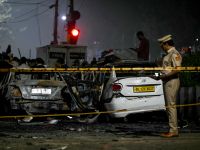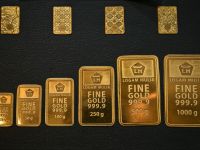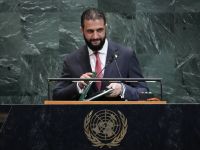Protesters around the Middle East took to the streets to voice disgust at any renewal of dialogue with Israel, as Arab and Israeli leaders held an emergency peace summit in Egypt.
In Gaza City, some 3,000 Palestinians protested against the summit but expressed support for Palestinian leader Yasser Arafat, who took part in the meeting at Sharm el-Sheikh alongside Israeli Prime Minister Ehud Barak.
"Tell the criminal Ehud Barak that the Arab people cannot be humiliated!" the protesters shouted, waving Palestinian flags and portraits of Arafat. "American and Israeli pressure will not stop the uprising!"
The protesters marched to the Palestinian parliament building where they burned wooden coffins symbolizing the Israeli-Palestinian accords, the Jewish state and the United States.
In the West Bank town of Ramallah some 50 masked members of the Tanzim armed wing of Arafat's Fatah movement fired in the air and threatened war on Jewish settlers.
Meanwhile, about 1,000 people turned out for the funeral of a Palestinian who died Sunday from a wound sustained in clashes three days ago.
Arafat was treated less diplomatically in other parts of the Middle East.
In Iran, around 1,000 people shouted "Down with Israel, Down with Arafat" as they hurled eggs at the UN office in Tehran.
Burning US and Israeli flags, many of the protesters pledged they were ready for jihad, or Islamic holy war, against the Jewish state.
They said they were waiting for orders from Iran's supreme leader Ayatollah Ali Khameini to "go support the Palestinians" and rejected any "discussion with the Zionist regime".
The call for war was also heard clear in Iraq, where some 5,000 men and women in military fatigues brandished guns as part of celebrations marking the fifth anniversary of a referendum confirming Saddam Hussein as president.
"Jerusalem and Baghdad are linked through the blood of martyrdom," they shouted. "Saddam Hussein is the standard-bearer of the liberation of Jerusalem!"
More than 100 people, nearly all of them Arabs, have been killed in more than two weeks of Israeli-Palestinian clashes in the West Bank and Gaza City that also spilled over into the Jewish state.
Palestinians in south Lebanon gathered outside Ain Helweh refugee camp and burned US and Israeli flags, chanting that the summit was orchestrated by the United States "to put down the new Intifada," or uprising.
"We urge Arafat not to meet with the murderer Barak, to declare a Palestinian state and to distribute arms to fight the Zionists," said Abu Ihab, an official of the Democratic Front for the Liberation of Palestine, a hardline PLO faction.
The Iranian foreign ministry called on "the Palestinian people, their resistance and the Islamic Intifada to show greater vigilance".
Foreign ministry spokesman Hamid-Reza Asefi said Israel was "itself the symbol of government-run terrorism" and that "the Zionist regime has drowned in the crisis it created itself".
The newspaper of Syria's ruling Baath party said Arab public opinion was justifiably suspicious of the Sharm el-Sheikh summit, "as it comes in the wake of a series of US positions backing blindly the aggressive policy of Israel".
"The fear, all the fear, is that one of the results of the meeting will be to put an end to the Intifada," Al-Baath said.
"This would abort what our people in Palestine have achieved with the blood of their martyrs. A continuation of the Intifada would change the current situation in favor of the Arabs and the rights they want to recover."
US academic Edward Said, a well-known Palestinian activist, blamed the explosion of violence on the Oslo autonomy accords of 1993.
"The Oslo accords resulted in this because they are very unjust and reflect the imbalance between the power of the Israelis and that of the Palestinians," Said told AFP in London.
"I am not at all surprised, I've been saying it since 1993. The result is what you see now" — NICOSIA (AFP)
© 2000 Al Bawaba (www.albawaba.com)







